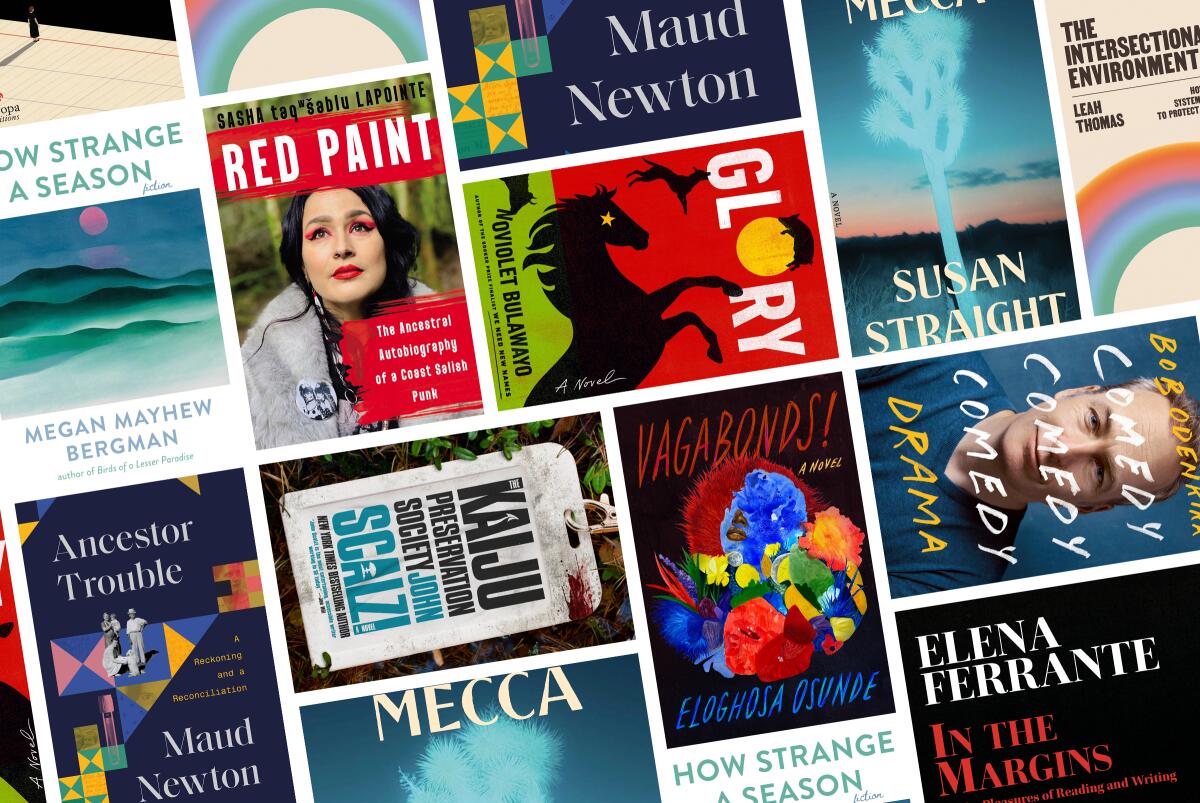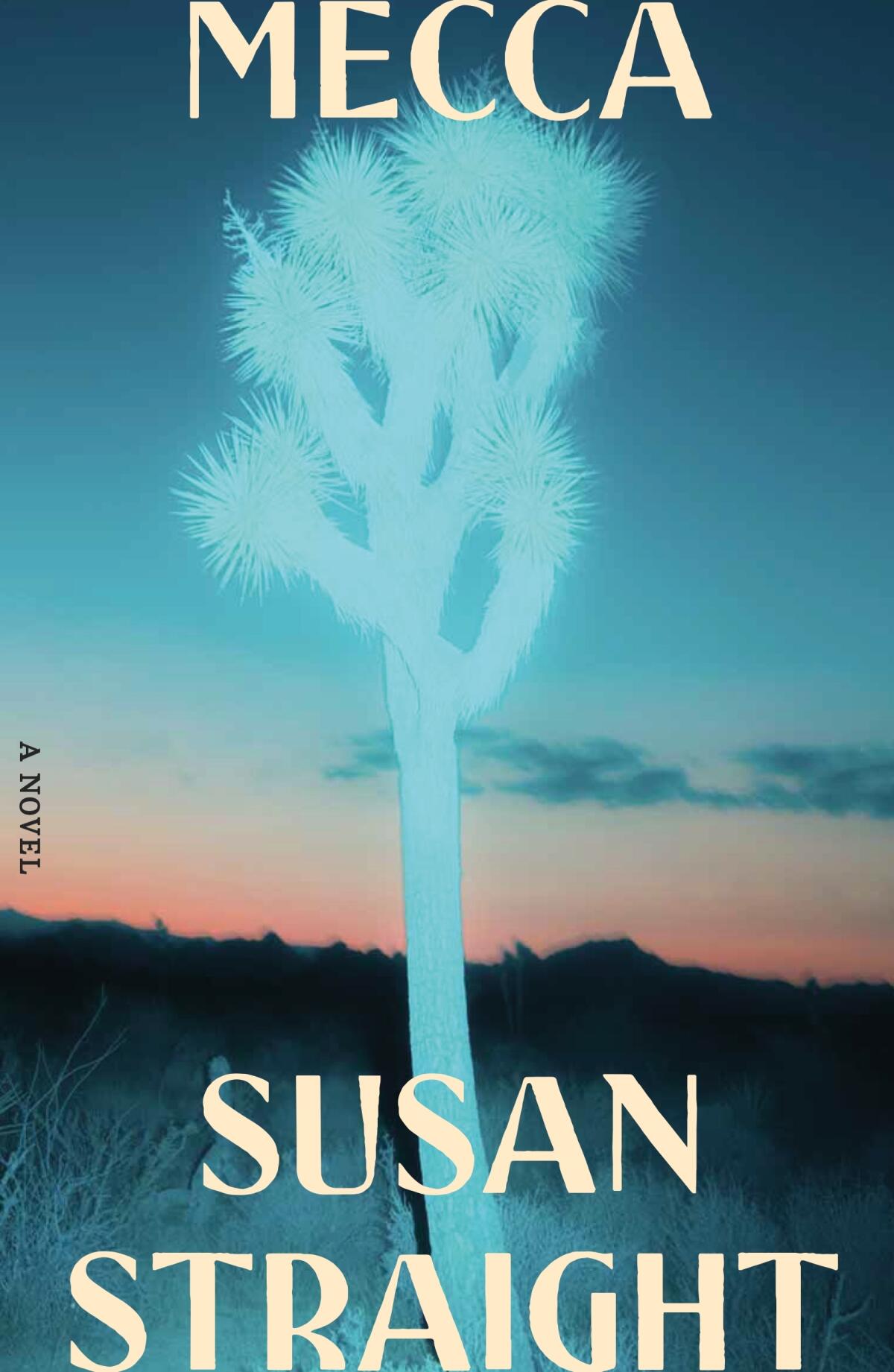10 books to add to your reading list in March

- Share via
Ten Books to Look Out For in March
If you buy books linked on our site, The Times may earn a commission from Bookshop.org, whose fees support independent bookstores.
Critic Bethanne Patrick recommends 10 promising titles, fiction and nonfiction, to consider for your March list.
From Bob Odenkirk’s fiercely honest memoir to Megan Mayhew Bergman’s climate-themed short stories, March’s best books will enter like lions and keep on roaring. Marking the start of spring are novels about underground Nigeria, otherworldly dinosaurs, the climate and California, along with nonfiction involving a family reckoning, an Indigenous punk memoir and more.
NONFICTION
“Comedy Comedy Comedy Drama”
By Bob Odenkirk
Random House: 304 pages, $28
(March 1)
At 60, Bob Odenkirk is a TV and movie star, acclaimed for serious turns in the “Breaking Bad”-iverse and the 2021 action-hero vehicle “Nobody.” But until he was nearly 50, Odenkirk toiled mostly off-screen in comedy writing — “Saturday Night Live” and then, with David Cross, the brilliantly semi-absurdist “Mr. Show.” He explains how he crossed over to acting and drama in a terrific memoir, his first book but not, one hopes, his last.

“Red Paint: The Ancestral Autobiography of a Coast Salish Punk”
By Sasha taqʷšəblu LaPointe
Counterpoint: 240 pages, $25
(March 8)
Raised in a family that moved often and had precious little to fall back on, LaPointe found refuge in the Northwest punk scene. But it wasn’t until she connected her need for expression with her grandmother’s efforts to preserve their ancestral language, Lushootseed, along with their tribe’s survival stories, that she began to understand what it might mean to heal — and to imagine a future.
“The Intersectional Environmentalist”
By Leah Thomas
Voracious: 208 page, $25
(March 8)
Thomas coined the term in her book’s title through her work as activist for both the planet and the humans who inhabit it. Her book, as much a manifesto as a guide, argues that we cannot fight for the Earth without advancing civil rights for all people, dismantling systems of privilege that threaten us on all fronts.

“In the Margins: On the Pleasures of Reading and Writing”
By Elena Ferrante
Translated by Ann Goldstein
Europa: 176 pp., $20
(March 15)
If you’ve recently thrilled to the adaptation of “The Lost Daughter,” these four new essays by the Neapolitan author will keep the thrill going, with peeks into Ferrante’s favorite literature, her writing process and even some of her bugbears. The greatest appeal of the collection lies not, however, in its glimpses into the reclusive writer’s life, but rather in the power of her writing.
“Ancestor Trouble: A Reckoning and a Reconciliation”
By Maud Newton
Random House: 400 pages, $29
(March 29)
If she doesn’t have you at “grandfather who married 13 times” and “17th century accused witch,” Newton will grab you with fluid, thoughtful prose about family and falsehoods. Estranged from her racist father and sometimes from her fundamentalist mother, the longtime book critic and journalist leaves no gravestone unturned in her investigation of what makes genealogy so compelling — even when flesh-and-blood family is something more complicated.
FICTION
“Glory”
By NoViolet Bulawayo
Viking: 418 pages, $27
(March 8)
In 2013, “We Need New Names” established the Zimbabwean novelist as an urgent new voice. In her new novel, “Glory,” Bulawayo employs allegory to explain the 2017 coup that removed Robert Mugabe from his near-40-year dictatorship over Zimbabwe. Animals stand in for people — Mugabe, for example, is “Old Horse” — allowing the author to underscore how beastly the politics of violence can be.

“Vagabonds!”
By Eloghosa Osunde
Riverhead: 320 pages, $28
(March 15)
If you read one debut novel in 2022, this should be it. With care, compassion and a gimlet eye for hypocrisy, Osunde builds a universe from Lagos, Nigeria’s little-seen citizens: The gay, the trans, the abused and others. Magical realism works to great effect in connecting these stories, especially when spirits Tatafo and Èkó are involved, and readers will remain rapt to the end.
“The Kaiju Preservation Society”
By John Scalzi
Tor: 272 pages, $27
(March 15)
Jamie, working as a food-delivery driver, jumps at the prospect of a new job offered by his friend Tom. But Tom’s “animal rights organization” is no PETA; it’s a group fostering dinosaur-adjacent panda-like creatures in a universe-adjacent Earth-like environment — and you can guess how that goes. It’s a great Scalzian blend of outrage, despair and wit, with the added ingredient of Japanese “kaiju,” a film genre meaning “strange beast.”

“Mecca”
By Susan Straight
FSG: 384 pages, $28
(March 15)
The fiercely local novelist (“In the Country of Women,” “Highwire Moon”) succeeds mightily in writing a new novel to be savored by not just Californians but all Americans who’ve been around the last couple of years. Her inland characters, many Latinx and all affected by COVID-19, must also contend with earthquakes, fires, droughts and police brutality. “Mecca” is a hymn of love and lamentation.
“How Strange a Season”
By Megan Mayhew Bergman
Scribner: 304 pages, $27
(March 29)
In this new collection by a teacher of literature and environmental writing at Vermont’s Middlebury College, mostly female narrators grapple with the environment in every sense — whether their piece of it involves a ranch, a peach farm or a swimming pool. They also grapple with control and the dimensions of a human life, in stories so beautifully crafted they feel like tiny worlds unto themselves.
More to Read
Sign up for our Book Club newsletter
Get the latest news, events and more from the Los Angeles Times Book Club, and help us get L.A. reading and talking.
You may occasionally receive promotional content from the Los Angeles Times.





